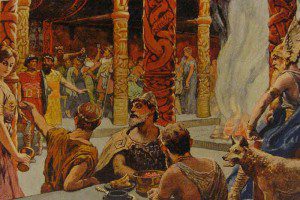 “Frith” is a common term heard among heathens, but what does it actually mean? Frith involves owning our responsibility to others: those for whom we are directly responsible, and those in our communities with whom we build our worth.
“Frith” is a common term heard among heathens, but what does it actually mean? Frith involves owning our responsibility to others: those for whom we are directly responsible, and those in our communities with whom we build our worth.
Heathens frequently say, “We are our deeds.” Frith is a part of that statement, for it requires active and mindful thought about those closest to us. It is reflected in our actions. Frith is part of ensuring the welfare of the real-world associations that we have consciously constructed or joined and that we maintain accountability for.
By committing acts that intentionally disrupt the well-being of a community, a person is essentially acting against frith, and they leave themselves open to being turned out. In this way, frith serves as a cornerstone for continued goodwill, active intent, and dedication to the well-cared for and peacefully maintained community.
Our inner circles include those to whom frith is given because frith works to preserve the peace and interests of our real-world communities. It emanates from our direct actions towards those close to us. This includes our families by blood, choice, and adoption, and extends to those we have taken a real-life oath. Through them, we maintain a community of common interests, values, traditions, beliefs, and ideals.
In my experience, frith is something best explained through personal demonstration, so here is an example from my own life. The man who lives in the house behind me has no responsibility to those who live in my home. He doesn’t call when my kids are ill, nor does he mow my lawn to ensure that I am not cited by the city for having overgrown grass. He is polite to me in passing, but he has no personal responsibility to me. However, if there were a problem in the neighborhood, or a dangerous person was causing distress on our shared street, then we would both have a responsibility to ensure that our homes and families remain safe from harm and that peace is maintained within our neighborhood. This outer web of connectivity works to ensure that those in close physical proximity to my home actively engage in maintaining our shared interests. In this example, my neighbor and I would both be working to protect the same community. We do not, however, take that responsibility for neighborhoods in another town. In this instance, frith is extended to someone not in my home or family. However, it is being shown to someone in close proximity who is working to achieve the same goals.
When we see the word “frith” mentioned online, as if it should be a common expectation, the word is often being misused to mean courtesy or respect. The idea of courtesy is different from frith because frith denotes personal responsibility to those closest to us, whereas people online are often complete strangers. We do not necessarily share the same ideals or motives with those we meet online, nor are we working together for the betterment of the same individual community or home. Many times, a courteous demeanor is needed for polite conversation online. While we are all accountable for what we say to others, courtesy does not necessarily involve ongoing responsibility to another. How others perceive what is said is up to them, not to us. It is not our responsibility to ensure that every stranger understands our reasoning. Each person is directly responsible for themselves and their own perceptions.
A good question to ask when having a dialogue with someone online is this: “Do I have a personal, real world responsibility to the person with whom I am speaking”? If the answer is “no,” then courteousness is all that is due. Courtesy and frith are not the same thing, however. Frith comes with a level of personal responsibility that cannot realistically be expected online from people we do not know.
Individual communities may have differing views on exactly when and how frith should be extended. Ancient tribes shared a common thread of commitment to the prosperity, health, and welfare of the people who lived within them, but different tribes also varied in their methods. This is why it’s difficult to develop a comprehensive spiritual approach that applies to, or even speaks for, all heathens. This is also why no set dogma exists in heathenry, because to establish such would be in direct opposition to the individual yet tribal nature that first defined heathenry.
In today’s world, which is exceptionally mobile, developing community can be challenging. Our closest relations may live miles (or even countries) apart from us, and they may have differing opinions on matters of faith and life choices. The people that are personally closest may be a kindred who share the same principles, religious beliefs, and traditions, but they may not be our immediate neighbors. Despite our best efforts, things may not be ideal in our families or chosen communities, nor always work out the way we planned. But for those we are responsible for, we work to keep debates on peaceful terms and search for the resolutions that are in everyone’s best interest, so that those families and communities can continue to develop. It is in these real world communities that frith is crucial.
Heathen Woman is published on alternate Fridays. Subscribe via RSS or e-mail!

















